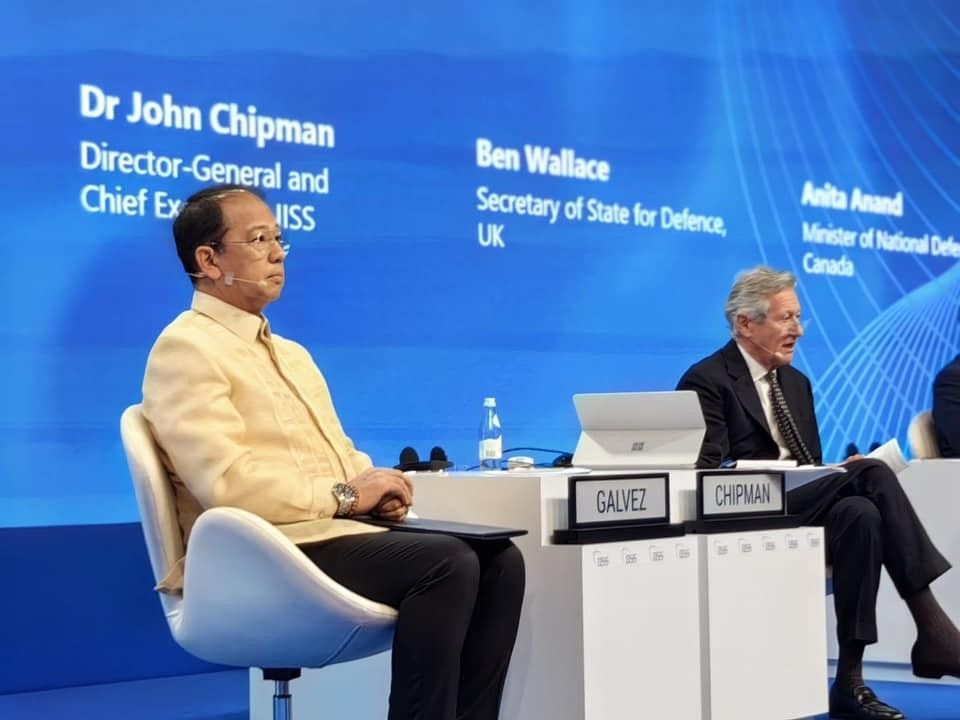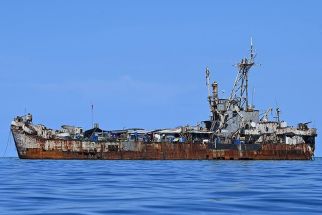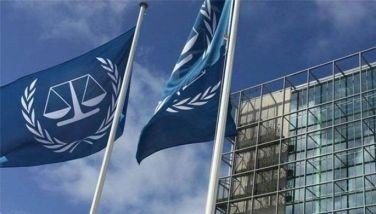Philippines pitches international law, multilateralism at top Asian defense meet

MANILA, Philippines (Updated 3:50 p.m.) — The Philippines during “Asia’s premier defense summit” stressed the importance of international law and multilateralism as it welcomed support for the 2016 arbitral ruling that invalidated China's sweeping nine-dash-line claim in the South China Sea.
Speaking before analysts, defense and diplomacy officials, and security experts, Defense Officer-in-Charge Carlito Galvez Jr. emphasized the importance of upholding the rule of law and of continuing dialogue with "vital voices" in the international copmmunity. Galvez made the remarks at the three-day International Institute for Strategic Studies Shangri-La Dialogue in Singapore.
During his speech on June 3, Galvez also noted that it was the United Nations Convention on the Law of the Sea that guided the Philippines in settling a dispute at the Hague tribunal.
“We realize that right alone, does not make might as it is ultimately your support that will preserve the global order at sea and uphold the universally recognized principles of international law,” Galvez said.
“Along this line, we welcome the G7’s recent statement which reaffirms the legally-binding nature of the award, and all other statements made by governments around the world which uphold the ruling as a milestone in corpus of international law.”
During the three-day G7 Summit held two weeks ago in Hiroshima, chief leaders of the United States, Japan, Italy, Canada, France, the United Kingdom, and Germany said in a communiqué that they oppose “China’s militarization activities in the region.” G7 countries also noted that they are open to working with nations for a free and open Indo-Pacific while opposing “any unilateral attempts to change the status quo by force or coercion.”
G7 leaders reiterated that the award given by the Permanent Court of Arbitration in 2016 is “legally binding upon the parties to those proceedings” and may also be used as a basis for resolving disputes.
READ: G7 declares support for South China Sea arbitral ruling
The Philippines has been dealing with intimidation and harassment by Chinese vessels in the West Philippine Sea, which China insists is part of its waters.
Support for multilateralism, strengthening ASEAN
During his speech, Galvez also highlighted the importance of multilateralism—or working with more states—to ensure regional peace and stability to establish trust among nations. This is an echo of the Philippine stance, with Foreign Affairs Secretary Enrique Manalo noting that multilateralism helps open up spaces for “more vital voices” in the international arena.
Galvez points to the Association of Southeast Asian Nations (ASEAN) as a good example of multilateralism that works. He said the regional bloc offers “a neutral ground where all table their interests in their region.”
“It is also in this light that the Philippines continues to seek a substantive ASEAN-China Code of Conduct in the South China Sea through a process that perseveres, despite the pressures of destabilizing actions and incidents of intimidation,” Galvez said.
The Department of Foreign Affairs said in December last year that the document is still “very far from concluding” and so far, only the preambular part of the code has been finalized.
READ: ‘Tensions are increasing’: Marcos urges ASEAN leaders to finalize SCS conduct
Other security agreements in the Indo-Pacific include the Quad—among Australia, India, Japan, and the US—as well as AUKUS, which invloves the US, UK and Australia.
China's defense minister warned Sunday against establishing NATO-like military alliances in the Asia-Pacific, saying they would plunge the region into a "whirlpool" of conflict. Li Shangfu's comments came a day after US and Chinese military vessels sailed close to each other in the flashpoint Taiwan Strait, an incident that provoked anger from both sides.
RELATED: China warns 'NATO-like' alliances could lead to conflict in Asia-Pacific
Beijing also previously expressed concern after Australia announced it was acquiring nuclear-powered submarines from the US through the AUKUS. – with reports from Agence France-Presse and Michael Punongbayan (The Philippine STAR newspaper)
- Latest
- Trending
































